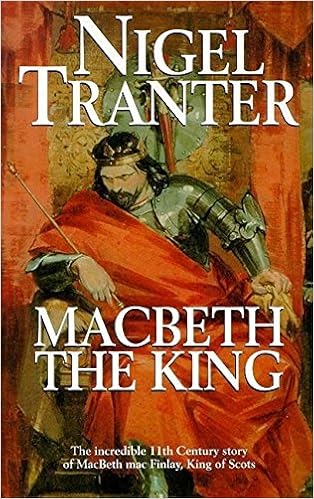|
Nigel Tranter, MacBeth the King (Hodder & Stoughton, 1978; Coronet, 1981) As a playwright, Shakespeare knows no equal. As a historian, however, he was a bit of a doofus.
Scottish novelist Nigel Tranter, who is unmatched in his efforts to present his country's history in novel form, gives the real MacBeth his due in MacBeth the King, an exciting story of Scotland's turbulent past. In it, we meet a determined but unambitious man whose love for Scotland outweighs his own desire for a quiet life. We meet Gruouch nic Bodhe (known only as Lady Macbeth in Shakespeare's play), his strong-willed and loving wife, and Thorfinn Sigurdson, Earl of Orkney and MacBeth's half-brother, a gruff but hearty and loyal Viking ally. We also see the nature of King Malcolm II, the Destroyer, MacBeth's despotic grandfather, and Duncan I, his successor to the throne (who was killed by MacBeth, not with a dagger in the night, but in a riveting, page-turning battle sequence). There are no witches confronting and confounding Tranter's MacBeth, although the writer does give a nod to Shakespeare's vision in a dream. In some ways, Tranter's MacBeth has more in common with Shakespeare's Hamlet -- at times indecisive and slow to take action, but determined once he gets moving. The novel incorporates a wealth of historical detail, including the varied mix of Christian and pagan, Scottish and Norse traditions making up MacBeth's Yule festivities, as well as a nearly comical visit by MacBeth and Thorfinn to Pope Leo in Rome. But this is no tedious history tome; Tranter's storytelling is enjoyable throughout. Readers also catch a glimpse of Scotland's last great age as a Celtic nation; after MacBeth's fall, English rules and customs began to creep into the country, even as the Roman church displaced its more liberal Celtic counterpart. The white-knuckle battle scenes which dominate the final portion of the novel are thrilling, frustrating and ultimately tragic. One can't help but wonder what might be different if young, illegitimate heir Malcolm or perhaps the treacherous MacDuff had fallen in battle, or if the ambitious Northumbrian Earl Siward had fixated on the weakly held kingdom to his south and less on the lands of his northern neighbors. If Scottish history appeals to you at all, do yourself a favor and find a copy of Nigel Tranter's MacBeth -- even if you have to go to Scotland to get it. 
|
 Rambles.NET book review by Tom Knapp 30 September 2000 Agree? Disagree? Send us your opinions!  



 |

